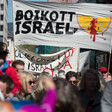The Electronic Intifada 6 July 2015

Divestment had broad grassroots support ahead of the United Church of Christ national meeting. (United Church of Christ/Flickr)
After a major US church overwhelmingly voted to divest from companies profiting from Israel’s occupation last week, two others rejected or delayed similar motions.
At its national gathering in Cleveland, Ohio, on 30 June the United Church of Christ (UCC) voted to divest by a landslide margin of 508 to 124.
Although the resolution had already been approved by 10 regional conferences, signaling broad grassroots support, victory was not guaranteed.
Sources within the UCC reported that many delegates had received personal calls from rabbis in their home communities pressuring them to vote against divestment.
The vote itself was held shortly after a keynote address by Rev. Mitri Raheb, the Palestinian pastor of Christmas Lutheran Church in the occupied West Bank town of Bethlehem.
Dashed hopes
But despite hopes that the UCC vote represented a “tipping point,” the Mennonite Church USA and the Episcopal Church failed to approve resolutions presented at their national gatherings.
At the Mennonite Church USA meeting in Kansas City, Missouri, delegates did not vote down the resolution that called for “withdrawing investments from corporations known to be profiting from the occupation and/or destruction of life and property in Israel-Palestine.”
But in the same session that saw near-unanimous support for a ban on drone warfare, delegates voted instead to table the Palestine-Israel resolution until the next convention in 2017.
Sources within the Mennonite Church USA blamed overconfidence and poor planning for the stalled initiative. With controversial votes regarding LGBTQ issues also being considered, those planning the agenda believed the Palestine-Israel measure would pass early and easily. However, once deliberations began, it was clear that delegates were divided and poorly informed.
“There were folks who would have voted in favor of the resolution but voted to table because of their concern over the lack of consensus in the room,” said Timothy Seidel, a member of the Mennonite Palestine-Israel Network, which drafted the resolution but had no control over the conference schedule.
The vote had been scheduled prior to a keynote address by Rev. Alex Awad, a Palestinian pastor with a long tenure at the church-sponsored Bethlehem Bible College. Awad arrived in Kansas City to the news that action had been deferred.
“I am trying to understand why a peace church is so reluctant about the BDS [boycott, divestment and sanctions] campaign,” Awad told The Electronic Intifada.
By the convention’s end, delegates unanimously passed a resolution pledging solidarity with individual Palestinian and Israeli peacemakers or “partners,” many of whom have urged the church to support boycott, divestment and sanctions.
Resolution rejected
Meanwhile, the Episcopal Church divestment measure at its Salt Lake City, Utah, convention faced an uphill battle from the start. The outgoing head of the church, Presiding Bishop Katharine Jefferts Schori, had stated previously that “the Episcopal Church does not endorse divestment or boycott.”
In the Episcopal Church, the US affiliate of the Anglican Communion, resolutions must first be approved by the House of Bishops before being debated and voted on by the House of Deputies. The divestment resolution was rejected by the House of Bishops and therefore not offered for further debate or a final vote.
Several bishops expressed concerns for the effect that a divestment resolution could have on the work of Anglican Archbishop Suheil Dawani. In 2010, Israel attempted to revoke the Jerusalem residency of Dawani, who is a Palestinian from the West Bank city of Nablus.
According to an Episcopal News Service report, bishops further claimed that the church already does not have “any direct investments” in companies such as Caterpillar, Hewlett-Packard, G4S and Motorola, or “other corporations that negatively impact Palestinians on the ground.”
The resolution rejected by the House of Bishops would have created an ongoing process to identify any investments “that support the infrastructure of Israel’s occupation.”
After a process of corporate engagement, companies failing to end such activities would have faced divestment. The resolution also called for a boycott of settlement products and businesses.
As of this writing, BDS advocates still hoped to at least raise their concerns during deliberations on a resolution concerning “positive investment” in “grassroots peace-building initiatives jointly led by Israelis and Palestinians” that was passed by the House of Bishops.
While many divestment advocates also support investment in the Palestinian economy and civil society initiatives, they say it remains a futile gesture as long as Israel retains ultimate control over the movement of goods, revenue and labor.
There is also broad concern among Palestinians and solidarity activists that joint Israeli-Palestinian initiatives focusing exclusively on dialogue without addressing the power imbalance amount to normalization of oppression and are counterproductive to a just peace.
Optimism
Donna Hicks, convener of the Episcopal Peace Fellowship Palestine Israel Network, takes the long view.
“Both the Presbyterians and the UCC took a decade to complete their internal processes before divesting,” she said. “We’re optimistic that today’s vote is just another step in our own process to ensure that we are not profiting from the occupation, and that divestment will pass at a General Convention in the near future.”
The Presbyterian Church USA, United Methodist Church and several Quaker bodies have all approved various forms of economic leverage to pressure Israeli compliance with international law and Palestinian rights.
Ryan Rodrick Beiler is a freelance photojournalist and member of the ActiveStills collective who lives in Oslo, Norway.





